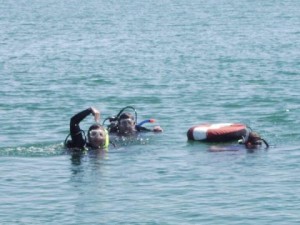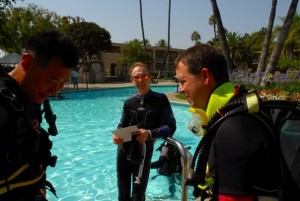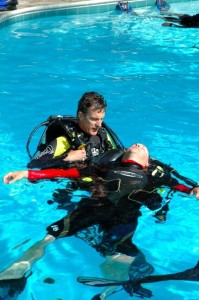Looking for your dream job? Want to turn your love of scuba diving into your new career?
Here are some possible career tracks:
- Boat Operator
- Dive Center Manager
- Dive Resort Manager
- Divemaster
- Scuba Instructor
- Aquarium Diver
- Commercial Diver
Looking at PADI’s online job board, there have been 46 jobs posted between 1-November and 9-November, from Scotland to the Maldives, Mexico to Cayman Brac. Lots of opportunities for Divemasters, Instructors and other qualified dive professionals.
Where to begin? If you’re not already certified, start as an Open Water Diver From there, progress through Advanced, Rescue, Master Scuba Diver and Divemaster Then, you’ll be in an excellent position to supervise divers, assist divers with their scuba equipment selection and purchases, and supervise certified divers.
As a Divemaster, you can expand your scuba career opportunities by earning your Captains license and being able to operate a dive boat. Taking classes in business, sales, hotel and resort management can help you towards managing a Dive Center or Dive Resort.
Ready to share your love of scuba with others? Become a PADI Open Water Scuba Instructor Now you can teach scuba lessons and certify scuba divers. You can then teach scuba courses including Open Water, Advanced, Rescue and Divemaster. Your students, though, will have their own interests. To meet their needs, you’ll want to be able to teach various specialty diver courses and be a PADI Master Scuba Diver Trainer One of the key benefits of the PADI courses is that you learn the business aspects of Scuba diving–including how to market and price courses as well as get a return on your investment in your own professional diver education.
Any time you’re working as a professional scuba diver, you should be prepared to respond to emergencies. The DAN Diving First Aid courses are ideal to prepare you to respond to such emergencies.
Other careers can include working at an Aquarium and Commercial Diving. Aquarium divers help maintain exhibits and take care of the aquatic creatures in their care. Commercial Diving can include underwater welding, construction, testing, inspection and many other exciting opportunities beyond the recreational realm.
If you’re ready to change your career or extend your existing professional scuba career, please Contact me I’d be happy to help you along your way.


